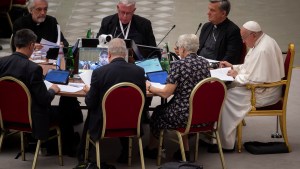The next assembly of the Synod on Synodality, also known as on the future of the Church will be preceded by a “penitential” vigil with Pope Francis and victims of abuse, on October 1, 2024, in St. Peter’s Basilica.
In presenting the program for the October session on September 16 at a press conference at the Vatican, the organizers also explained that theologians’ work on around 10 topics will be presented at the beginning of the assembly.
The Synod on Synodality is a major project launched by Pope Francis in 2021, designed to help the laity engage in Church life. After various phases of local and regional consultations and reflections, a general assembly was held in October 2023 to be followed by a second and final session this coming October.
The penitential celebration
A new feature this year is that, on the eve of the opening of the second session of the assembly, the 368 members, more or less the same group as last year, will take part in a public request for forgiveness. This event, which will conclude two days of spiritual retreat for the participants, will open with the testimonies of three people: those who have suffered sexual abuse, war, and the struggles of migration. It will be presided over by Pope Francis.
These testimonies will be followed by a “confession” naming “some of the sins that cause most pain and shame, invoking God’s mercy,” explained Cardinal Mario Grech, General Secretary of the Synod.
“It will not be a matter of denouncing the sin of others, but of recognizing oneself as part of those who, by action or at least omission, become the cause of the suffering suffered by the innocent and helpless.”
“At the end of this confession of sins, the Holy Father will address, on behalf of all Christians, a request for forgiveness to God and to the sisters and brothers of all humanity,” Cardinal Grech said.
The Synod wants to “communicate to the world that the Church is in this dynamic of conversion […], that we recognize our limitations, our weaknesses, that we are open to convert, to always learn with the help of the Lord,” Cardinal Grech continued.
A focus on young people
The organizers are particularly encouraging younger generations to attend this service. “The event, […], will be open to the participation of everyone, especially young people, who always remind us how much the proclamation of the Gospel must be accompanied by a credible witness, which they first wish to offer to the world together with us,” Cardinal Grech explained.
“Young people suffer from our sins, from the sins within the Church, and so it is also good for them to know that there is a penitential act, that we are not proud of all that the Church has not done too well,” emphasized Cardinal Jean-Claude Hollerich, General Reporter of the Synod.
Other major events during the Synod will include an ecumenical prayer on October 11 with delegates from other Christian denominations, who are more numerous this year than last. This year they will be 16, compared with 12 in October 2023.
10 Themes presented by experts
Another new feature: On the first day of the assembly, October 2, experts will present their work on themes that were the subject of debate last year, including governance in the Church, the role of women, and the question of the female diaconate.
The Synod secretariat announced last spring that Pope Francis had set up 10 commissions of experts, theologians, and canonists, to focus on the issues that had emerged during the 2023 assembly. These themes “have not been set aside,” said Cardinal Grech.
He explained that these questions were “in need of further study,” and that the creation of these study groups was in itself a response to the Synod’s first assembly.
The study groups will communicate what they are doing, their action plan, how they intend to move forward, Cardinal Grech explained. Ultimately, the conclusions of all the groups will be submitted to Pope Francis by June 2025.



